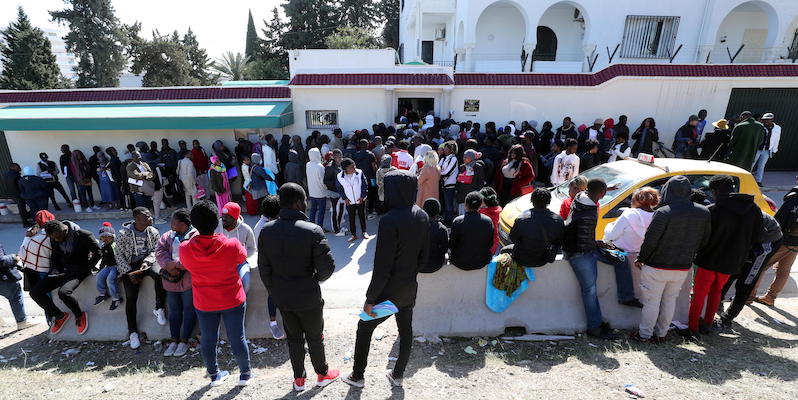For some weeks now, Kais Saied, the president of Tunisia who is governing in an increasingly authoritarian manner, has attacked the sub-Saharan immigrants present in the country with exceptional harshness. In Tunisia there have recently been some serious racist episodes incited directly by the president, to the point that the Ivory Coast and Guinea decided this week to organize special flights to repatriate their compatriots present in Tunisia.
In the last three years Saied has given an authoritarian turn to the government of the country, with a greater concentration of power in his own hands, the emptying of the functions of parliament and the repression of political opponents, subject to arbitrary arrests. However, Tunisia is also grappling with a major economic crisis: for long periods there has also been a lack of basic necessities and popular support for the president has dropped significantly. For this reason Saied, elected in 2019 with a populist proposal and a break with traditional parties, is trying to blame the country’s problems on immigrants from sub-Saharan African countries.
– Read also: Protests against Saied’s repressions in Tunisia
In a very violent speech, first delivered on February 21 and then repeated via social media, Saied accused “hordes of illegal immigrants of bringing violence, crime and other unacceptable practices to Tunisia”. He further argued that immigration from African countries was part of a project of “demographic replacement to make Tunisia a uniquely African country, losing its ties to the Arab and Islamic world.”
In short, Saied adapted the racist and conspiracy theory of the “great replacement” to the Tunisian context, popular in the Western far right and also inspiring some mass massacres. In the white supremacist version, the worldwide conspiracy would aim for the replacement of whites by blacks and migrants. Saied reworked it by targeting sub-Saharan migrants and announcing that “urgent measures would be needed to stop this incessant flow of illegal immigrants”.
In Tunisia, in reality, migrants from other African countries, excluding those from the Maghreb, according to official Tunisian estimates, there are around 21,000. According to other international bodies, they could reach 50,000, compared to a total population of 12 million inhabitants. Most entered legally: in recent years the Tunisian government had eliminated the need for a visa for many African countries, to facilitate trade. Only a small portion of migrants have Tunisia as their final destination: often the country is a stage in a longer and increasingly complex journey to Europe. According to data from the United Nations High Commissioner for Refugees, there were just over 6,000 asylum seekers, mostly Syrians.
A demonstration in support of migrants (AP Photo/ Hassene Dridi)
However, Saied’s words had immediate effects in the country: not only did the police arrest undocumented migrants, but they were reported various attacks (in Sfax and Tunis) to people originally from sub-Saharan Africa and many families found themselves homeless, evicted from their rented houses. In recent weeks, the Guinean and Ivory Coast embassies in Tunis have received many requests for help and hospitality, which led to the decision to organize repatriation flights.
The African Union condemned the “form and substance” of Saied’s message, with an official statement, while some demonstrations in support of migrants have been organized in Tunis in recent weeks. Another was scheduled for Sunday, organized by the main opposition coalition to also denounce the campaign of political arrests, but it was banned: the official reason is that the organizers were «suspected of plotting against the security of the state».
The Chairperson of the African Union Commission @AUC_MoussaFaki strongly condemns the racial statements on fellow Africans in #Tunisia. pic.twitter.com/7DQPkEYLkg
— African Union (@_AfricanUnion) February 25, 2023
